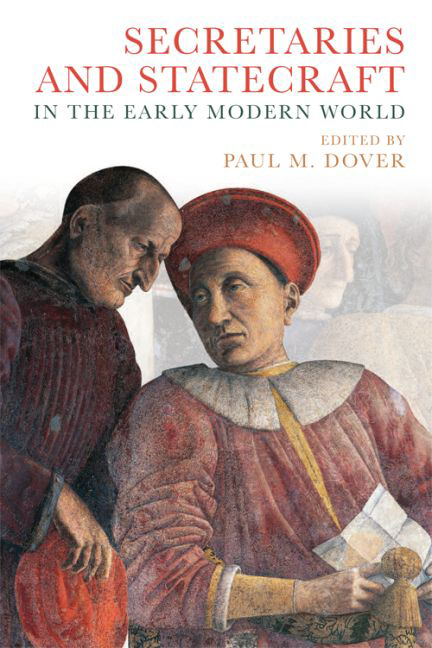Book contents
- Frontmatter
- Contents
- List of Contributors
- 1 Introduction: The Age of Secretaries
- 2 Records, Politics and Diplomacy: Secretaries and Chanceries in Renaissance Italy (1350–c. 1520)
- 3 Mercurino di Gattinara (1465–1530): Imperial Chancellor, Strategist of Empire
- 4 ‘This continuous writing’: The Paper Chancellery of Bernhard Cles
- 5 Parables and Dark Sentences: The Correspondence of Sir William Cecil and William Maitland (1559–73)
- 6 Axel Oxenstierna and Swedish Diplomacy in the Seventeenth Century
- 7 Statecraft and the Role of the Diplomat in Ducal Savoy: The Career of Alessandro Scaglia (1592–1641)
- 8 Richelieu, Mazarin and Italy (1635–59): Statesmanship in Context
- 9 The Learned Ideal of the Mughal Wazīr: The Life and Intellectual World of Prime Minister Afzal Khan Shirazi (d. 1639)
- 10 Reconsidering State and Constituency in Seventeenth-Century Safavid Iran: The Wax and Wane of the Munshi
- 11 Choreographers of Power: Grigorii Kotoshikhin, State Secretaries and the Muscovite Royal Wedding Ritual
- 12 Eberhard von Danckelman and Brandenburg's Foreign Policy (1688–97)
- 13 Chancellor of State: Prince Wenzel Anton Kaunitz, the Habsburg Foreign Office and Foreign Policy in the Era of Enlightened Absolutism
- Index
9 - The Learned Ideal of the Mughal Wazīr: The Life and Intellectual World of Prime Minister Afzal Khan Shirazi (d. 1639)
Published online by Cambridge University Press: 21 November 2017
- Frontmatter
- Contents
- List of Contributors
- 1 Introduction: The Age of Secretaries
- 2 Records, Politics and Diplomacy: Secretaries and Chanceries in Renaissance Italy (1350–c. 1520)
- 3 Mercurino di Gattinara (1465–1530): Imperial Chancellor, Strategist of Empire
- 4 ‘This continuous writing’: The Paper Chancellery of Bernhard Cles
- 5 Parables and Dark Sentences: The Correspondence of Sir William Cecil and William Maitland (1559–73)
- 6 Axel Oxenstierna and Swedish Diplomacy in the Seventeenth Century
- 7 Statecraft and the Role of the Diplomat in Ducal Savoy: The Career of Alessandro Scaglia (1592–1641)
- 8 Richelieu, Mazarin and Italy (1635–59): Statesmanship in Context
- 9 The Learned Ideal of the Mughal Wazīr: The Life and Intellectual World of Prime Minister Afzal Khan Shirazi (d. 1639)
- 10 Reconsidering State and Constituency in Seventeenth-Century Safavid Iran: The Wax and Wane of the Munshi
- 11 Choreographers of Power: Grigorii Kotoshikhin, State Secretaries and the Muscovite Royal Wedding Ritual
- 12 Eberhard von Danckelman and Brandenburg's Foreign Policy (1688–97)
- 13 Chancellor of State: Prince Wenzel Anton Kaunitz, the Habsburg Foreign Office and Foreign Policy in the Era of Enlightened Absolutism
- Index
Summary
The seventeenth century represented the zenith of the Mughal Empire's power, territorial reach and global influence. Best known for the construction of the Taj Mahal and other iconic monuments of early modern Indo-Islamic architecture, it was also an era when Mughal wealth, religious pluralism and cultural patronage inspired envy and awe practically the world over, including among many of the Europeans who travelled to the subcontinent and reported back on their experiences. Indeed, it was precisely in this period that the term ‘Mogul’ entered the English language as practically synonymous with conspicuous wealth and splendour. But beyond a merely superficial admiration for all the opulence that Mughal India had to offer, seventeenth-century European observers like Thomas Roe and François Bernier also expressed a keen appreciation for the openness and tolerance of the Mughals’ distinct brand of political Islam, a pluralistic approach that used state policies to promote an ideology known at the time as ‘universal civility’ (ṣulḥ-i kull). It was through such policies, Roe argued in a 1640 speech to the English Parliament, that the Mughal emperors had been able to avail themselves of the talents of all of India's multiple ethnic, religious and linguistic communities, and even to attract skilled labour, administrators, literati, scholars and artists from all over the world to their courts. Tolerance, in other words, was good for business; and it was thanks to such policies, Roe pointed out to his fellow MPs, that the reigning emperor Shah Jahan (r. 1628–58) had managed to become the richest man in the world.
Among the many who came to India and thrived under the Mughal dispensation of ṣulḥ-i kull was a Persian statesman named Mirza (or sometimes ‘Mulla’) Shukr Allah Shirazi, better known today by his official title of Afzal Khan (d. 1639). Afzal Khan came to India early in the seventeenth century during the reign of Jahangir (r. 1605–27), the fourth of the so-called Great Mughals whose courts dominated the culture and politics of much of the Indian subcontinent until the early eighteenth century. But it was under Jahangir's successor Shah Jahan, the celebrated builder of the Taj Mahal, that Afzal Khan reached the pinnacle of his career, serving as prime minister (wazīr, or dīwān-i kull) for nearly a decade.
- Type
- Chapter
- Information
- Secretaries and Statecraft in the Early Modern World , pp. 177 - 205Publisher: Edinburgh University PressPrint publication year: 2016

